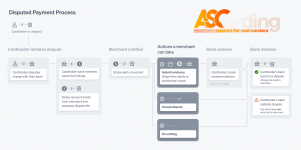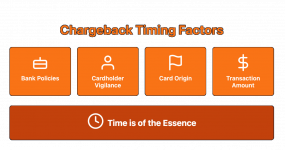d0ctrine
Diamond
- Joined
- 17.08.24
- Messages
- 107
- Reaction score
- 4,250
- Points
- 93

Today were diving deep into the murky waters of chargebacks - the bane of every carders existence and an important tool of every legitimate consumer whos been screwed over by a shady merchant.
Ever wondered how you could order something, get it verified and then low and behold before it ships it gets cancelled due to chargeback? Yet how come some cards take a minimum of 2 months to chargeback/dispute a charge? Its like the financial worlds own version of quantum mechanics - seemingly contradictory and often confusing but if you understand it, you can bend reality to your will.

Were not just talking about the basic 'customer calls bank, bank reverses charge' bullshit here. No, were going to peel back the layers of this onion and expose the inner workings of the chargeback process. From the moment a dispute is initiated to the final decision, well break down every step and show you how each player in this game - banks, merchants, and payment processors - tries to cover their own ass while potentially screwing over everyone else.
But wait, theres more. Were also going to tackle a new beast in the jungle: early fraud alerts. Well dissect what these alerts mean for us carders and how theyre reshaping the industry of carding.
So grab a drink, tell your Telegram groups youre going dark for a bit, and lets dive into the world of chargebacks. By the time were done youll understand this system better than the dipshits who designed it. And remember that knowledge is power - especially when that knowledge helps you stay one step ahead of the game.
Disclaimer: The information provided in this write-up is intended for educational purposes only. It is a study of how fraud operates and is not intended to promote, endorse, or facilitate any illegal activities. I cannot be held liable for any actions taken based on this material. Please use this information responsibly and do not engage in any criminal activities.
Chargebacks
Youve just pulled off a sweet score, carding some overpriced shit from an unsuspecting merchant. But before you can pat yourself on the back you need to understand the clusterfuck thats about to unfold behind the scenes. Welcome to the world of chargebacks.
At its core, a chargeback is just a fancy way of saying 'gimme back my fucking money.' When the real cardholder notices a charge they didnt make (thats you, dipshit) they call their bank and raise hell. This kicks off a process thats as convoluted as it is slow.
Heres the basic flow:
- Cardholder Dispute: The mark notices the charge and calls their bank. 'I didnt buy this crap!' they scream.
- Bank Investigation: The bank doesnt just take their word for it. They do some digging, which usually involves reaching out to the merchant.
- Merchant Response: The merchant gets a chance to prove the transaction was legit. Good luck with that, fuckers.
- Bank Decision: After weighing the evidence (or lack thereof), the bank makes a call. More often than not, they side with the cardholder.
- Money Movement: If the chargeback sticks, the funds get yanked from the merchants account.

Sample from Stripe
Now you might be thinking that it sounds simple enough. But heres the thing: this process can take anywhere from a few days to several months. Yeah you read that right. Months. And thats where things get interesting for us carders.
Some chargebacks happen fast while others move slower than someone on Xanax. This inconsistency is what keeps our game interesting and profitable.
Chargeback Roulette

Lets cut the shit and break down why some chargebacks happen fast while others are slow:
Bank policies play a huge role. Some banks have automated systems that flag suspicious transactions instantly expediting the chargeback process, while others are still using tech that was outdated when dinosaurs roamed the Earth. The type of transaction matters too - big ticket items and purchases from high-risk merchants obviously get flagged faster.
Cardholder vigilance is another key factor. Some people check their statements more often than they check their phones, while others might not notice a fraudulent charge for weeks or months. And lets not forget about the merchants - some fight chargebacks like their lives depend on it, while others are slow to respond and simply dont give a flying fuck since they know theyll lose the dispute process anyway.
US cards tend to be more advanced when it comes to fraud detection and chargebacks. The financial institutions in the Land of the Free are paranoid as fuck, which means chargebacks on US cards often hit faster. God bless America, amirite? This is not just about technology - its about a whole system geared towards protecting cardholders (and screwing over carders like us).
The amount of the transaction plays a role too. A $5k electronics purchase raises flags quicker than a $20 fast food order. Not only from the perspective of the bank, but also from the cardholders perspective. Someone using their card to buy a Netflix subscription wont get them all too worked up (because it might just be their brother using their card) but a $3,000 purchase of jewelries might give them a heart attack.
For carders, understanding these factors is important. Its about knowing how long youve got before shit hits the fan and if the shop youre buying from cancels shipment on already verified purchases or even worse, request shipped goods to be returned back to their warehouse once they get a smell of a chargeback. Remember: some cards give you a long grace period, others will have you scrambling fast.
Adapt your strategy based on these factors. Hit the right targets with the right cards at the right time, and you might walk away clean. Fuck it up, and you will find your self unprofitable with tons of 'SHIPMENT RETURNED' notices.
Early Dispute Alert Systems

Early Fraud Alerts isn't just a new toy for merchants; it's the real deal when it comes to speeding up chargeback response times and decreasing our profits. We're not just racing against shipping times anymore; we're up against sophisticated tools that give merchants a heads up the moment a dispute or chargeback is initiated (even before the investigation starts).
These systems like Verifis Rapid Dispute Resolution, Ethoca Alerts and ChargeBlast are creating a direct pipeline between banks and merchants. When a cardholder so much as sneezes in the direction of a dispute the bank shoots that info through these networks and they rat on the transaction by contacting the merchant. The result? Merchants are getting tipped off within hours, sometimes even minutes. It's like they have a crystal ball and it's bad news for us.
For carders this means our window of opportunity is getting smaller. Merchants aren't just sitting ducks anymore. They can freeze orders or halt shipments before a full chargeback even happens.
What does this mean for us? Speed isnt just important anymore; its do or die. Were not just racing against the cardholders vigilance now. Were in a full-on sprint against these alert systems that are itching to prevent our orders from getting in our hands. Its a two-front war and we need to be smarter, faster and more strategic than ever before.
We need to think about our approach. Hit during high volume times when these systems are overwhelmed with data. The tsunami of transactions during Black Friday or Cyber Monday might give us an opportunity to slip through the cracks. And remember, these tools are powerful but not perfect. They still rely on cardholders noticing and reporting unauthorized charges. We can always run a spam campaign on the holder's email and phone number so they have no idea. Our job is to stay one step ahead, find the weak links and exploit them before they catch up.
Closing Thoughts: Adapt or Die
The world of chargebacks and fraud detection is evolving faster than a virus in a petri dish. As carders we need to stay ahead of the curve or risk becoming as obsolete.
Understanding the intricacies of chargebacks - from the factors that affect their speed to the new early alert systems - is crucial for our survival. Its not just about knowing how to card anymore; its about understanding the entire ecosystem were operating in.
The tools are getting smarter but so are we. Its time to show what were capable of in this evolving game. Remember that in the world of carding, knowledge isnt just power - its fucking survival.
So stay informed, be ready to change tactics on a dime and never stop learning. The chargeback game might be getting harder but that just means the rewards for those who master it are even sweeter. Now get out there and show these banks and merchants what real innovation looks like.
d0ctrine out.
Last edited:


